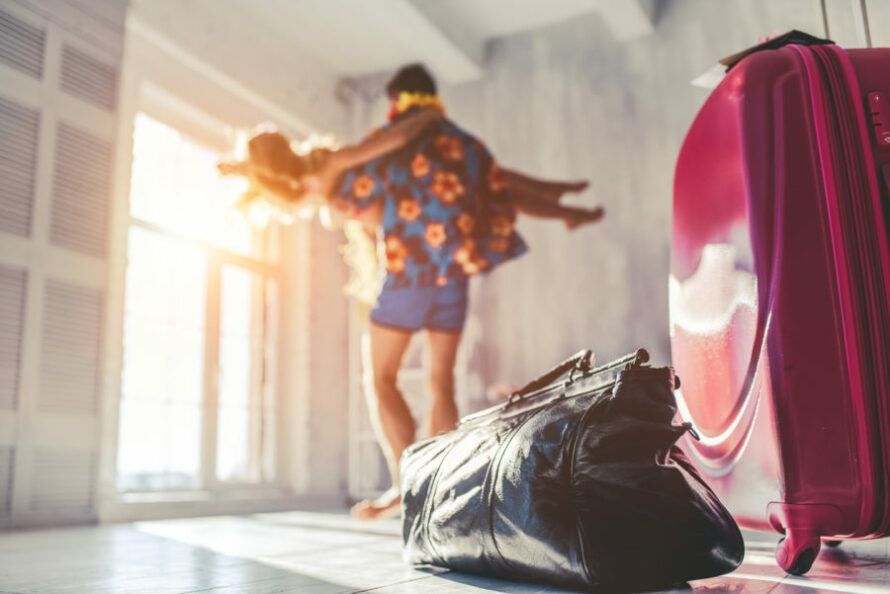Planning your wedding is fun and all, but don’t forget one of the other fun parts of getting married. Your honeymoon!
Planning where you’re going on your honeymoon is incredibly fun and rewarding. But if you’re travelling to a location where English isn’t the primary language, it can also be daunting thinking about what languages you might need to learn!
Don’t just try and fumble your way through your trip (or worse, just expecting everyone is going to speak English back to you). Whether you’re going to Fiji, Japan, Italy or elsewhere, here are some honeymoon phrases that will help you get a grasp of the language before you travel.
Of course, the added bonus with learning phrases for your honeymoon is that there’s two of you! So while you should both learn your more common phrases, having someone in charge of dining or someone in charge of learning the transport phrases can make life a bit easier if you struggle with languages.
Courtesy phrases
“Hello”
Learning this one speaks for itself.
“Goodbye”
So does this.
“Thank you”
If thank you isn’t already in your regular vocabulary, then now is the time to learn. Plus, the locals will love you for it.
“Please”
Please is obviously a great phrase to add onto any question. Whether you’re ordering at a restaurant or catching a cab to the airport, a simple please in their language can do wonders to your experience with a local service provider.
“Excuse me”
Particularly if you’re in any particular tourist hotspot, it can be inevitable that you might bump into a person or two, so this is definitely a good phrase to have in your travel vocab!
“Sorry”
Similar to excuse me, this is another great one when you’re travelling around busy areas.
“Yes”
“Do you want to try and respect our culture?”
“Oui”
“No”
“Are you going pretend that English is the only language spoken in the world?”
“Non”
More common conversation
“Sorry I only speak English”
It can be incredibly flattering to be mistaken for a local or well-versed tourist, but it does pose the problem of not being able to actually help the person who has asked something of you!
This one can also be swapped out for the phrase “sorry, I don’t speak…” and substituting the language in.
“I don’t understand”
This is another really good phrase to have when travelling, and not just if someone asks you something in their native language. It can also be useful if a service provider is explaining how something works, and you genuinely need more information.
“Can you please repeat that?”
Please try to avoid this one where you can if someone is making an effort to speak English to you, but we know that it’s not always avoidable in other situations. Whether your French is a bit slow and you haven’t quite got the phrase yet, or background noise makes it difficult to hear, adding a please and a thank you to this will help your hosts see you in a better light.
Numbers one through 10
While it can be easy to simply use your hands to gesture how many scoops of gelato you want (the answer is always a lot), it’s nice to show that you’re actually making an effort in another country. Learning the numbers one to 10 can be extremely useful for ordering food or confirming reservations. Even if you have to accompany it by counting with a few fingers to make sure you’ve got the number right, showing that you’re trying to make an effort will go a long way.
Dining
“May I please have…”
When it comes to eating out, knowing how to order is extremely useful! You might still have to use the menu as a guide, but if you can at least do more than simply point at the food you want and then say “please”, then your server will likely appreciate it!
Learning the phrase “may I please have” rather than “order” will also mean you can use the same phrase when it comes to shopping.
“A table for two”
Again, instead of simple motioning that there are two of you with your hands, asking for a table in a busier restaurant might actually get you a better spot.
“Can we please have the cheque”
I must admit, in my younger travelling days I’ve been guilty of miming writing on a cheque with my hands (I know, get out). Adding please onto this phrase, and learning which countries you’re going to that have mandatory tipping, will be very useful.
Small / large
Nobody wants to end up with an entire chicken on their plate (or do they?)
Anything to do with dietary requirements
If you have dietary requirements take the time to learn what phrase you’ll need to avoid any nuts, dairy, gluten etc.
“Cheers”
Look, this one probably isn’t necessary. But if you’re travelling for Oktoberfest, or just like making new friends overseas, this will be a bit of fun!
Travelling
“To the airport”
If you’re catching a cab or asking how to get somewhere, check to make sure you have the airport and terminal number correct, and add a please in here! This is going to be another area where knowing your numbers might come in handy.
“To this hotel/restaurant”
If you’re travelling from the airport knowing which hotel you’re going to will be useful, even if you keep the hotel address in your passport which you’re in transit. Also knowing how to get to a renowned restaurant if you’ve booked something special is useful. Make sure you have the address as well as the name, just in case!
“Is this the train/bus/ferry to…”
Again, if you’ve got your destination ready, check whether you’re going to end up there! Depending on where you’re travelling public transport may consist of a train, bus, or ferry, so check which forms of transports you’re thinking of catching and see whether you need to learn the phrases for each.
“What time is the train/bus/ferry?”
Whether you’re asking for the next service, or simply want to know how to get from A to B, this is a useful phrase to learn.





